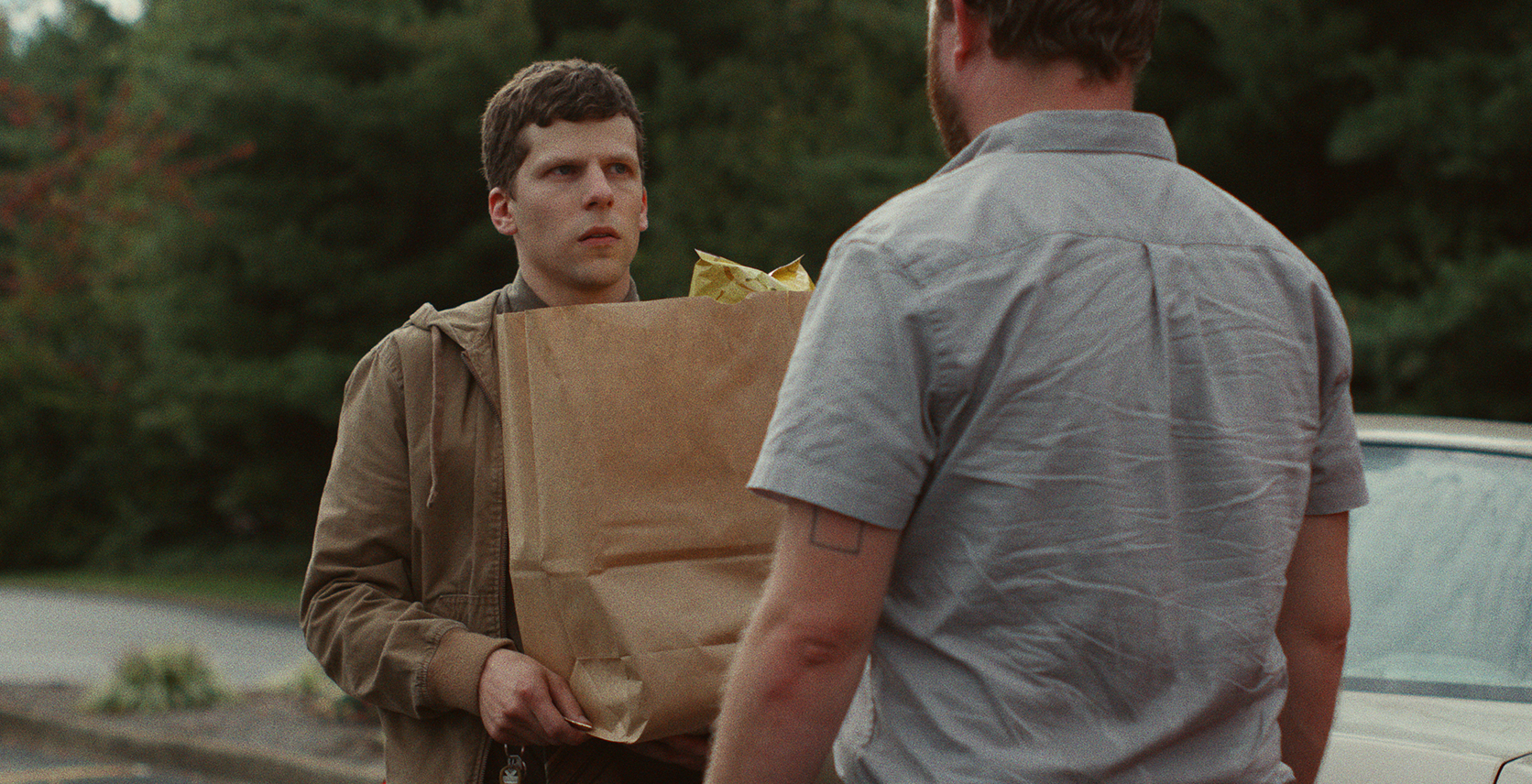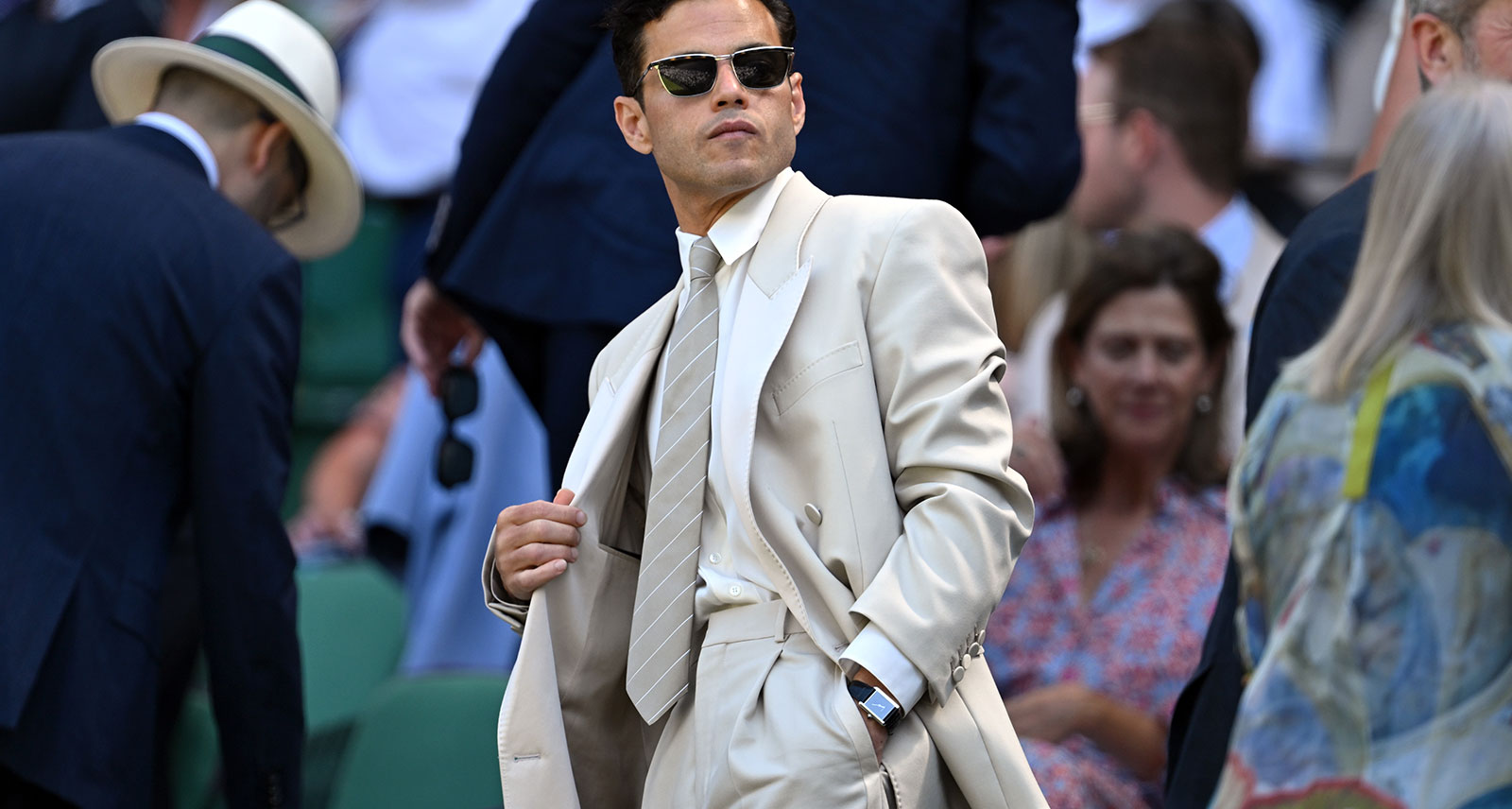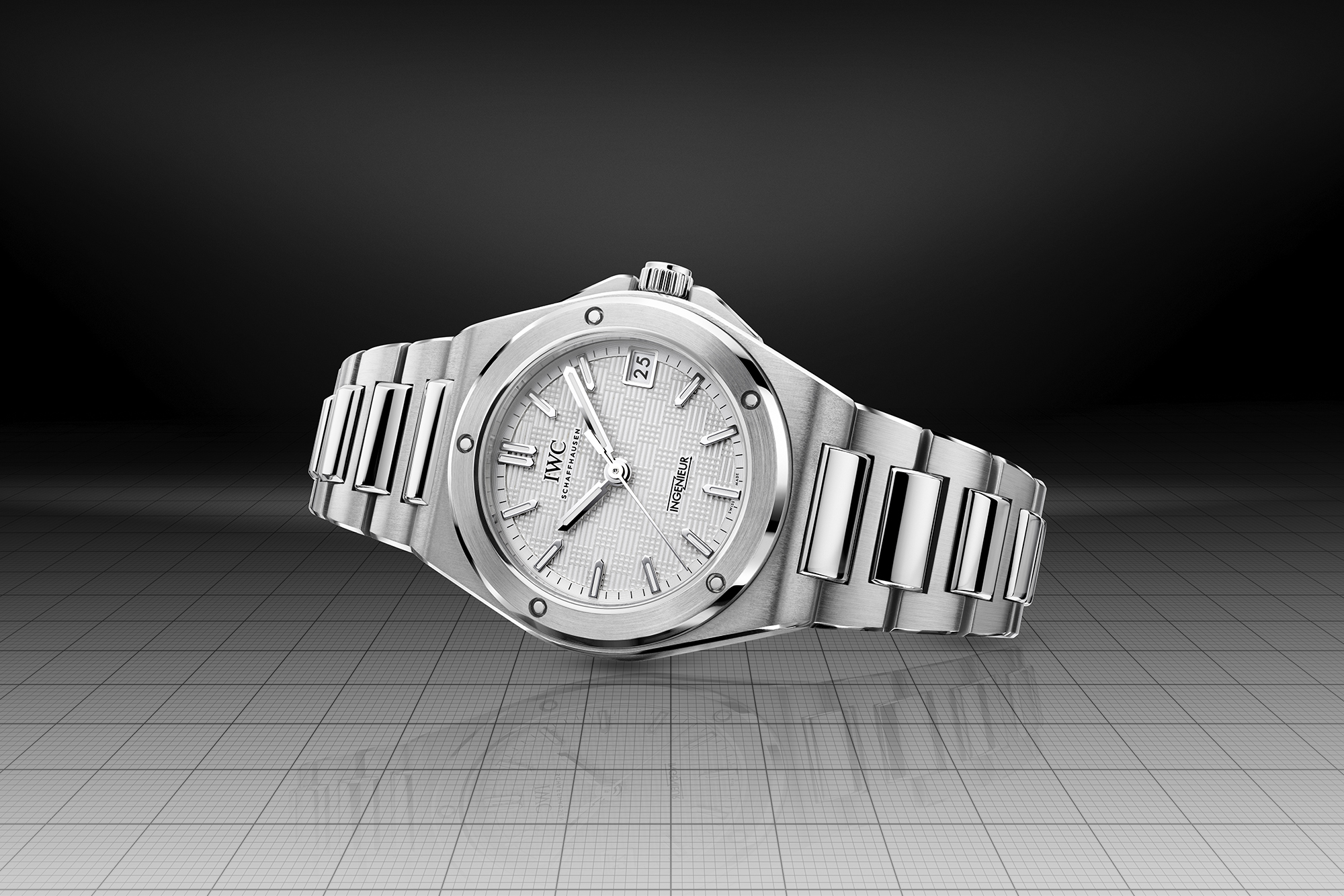Jesse Eisenberg on Playing a Karate Guy and Satirizing Toxic Masculinity for His New Movie ‘The Art of Self-Defense’
Before you read any further, I should probably note that I don’t typically begin interviews by telling the person I’m talking to how much I liked their movie. Or singing Lonely Island songs. But sometimes, things take a turn for the unexpected. And that’s very much the case in The Art of Self-Defense, the upcoming offbeat dark comedy from writer/director Riley Stearns. Starring Jesse Eisenberg as Casey, his character starts out more or less how you’d expect: as a meek, unassuming, socially-awkward outsider. Or, in other words, a clear-cut “Jesse Eisenberg type.” Until, after a brutal mugging lands him in the hospital, he signs up for karate classes to learn how to protect himself.
But that’s just the launching point for this singularly oddball comedy, and to say any more would be to give away the joy of watching a movie that starts out one way only to take a hard left into unforeseen territory. That’s because The Art of Self-Defense is about karate in the same way Taxi Driver was about driving cabs. Behind the inherent dorkiness of its strip mall dojo veneer is a sneakily clever, and especially topical, satire about toxic masculinity and outmoded notions of what it means to “be a man” – from the type of music a guy should listen to, to the manliest foreign languages and/or dog breeds. It’s the kind of movie that seems primed to become a future cult classic, the perfect counterprogramming for anyone looking for a break from formulaic summer blockbuster fare.
With The Art of Self-Defense coming to theatres on July 19th, we spoke to Eisenberg about why he was initially reluctant to take this part, what ultimately convinced him, and, yes, playing a karate guy. Kiai.
I have to tell you: I really dug this movie. It’s right on my wavelength, tonally, comedically.
Me too. That’s awesome.
Plus, as an added bonus, I’ve had that Lonely Island song from Popstar stuck in my head all morning. “Karate Guy.”
Wait. What is that?
Did you see Popstar?
No, but the actress in this movie [Imogen Poots] is in it.
Oh, that’s right! I didn’t even realize that.
What’s the song? How does it go?
“I like to kick it. I’m a karate guy. Kiai. Kiai.” It’s very dumb, but it’s one of those earworm-type songs.
Oh, I have to look for it. That’s really funny. OK, yeah, now I have to listen to it.
It’s amazing, I highly recommend it. OK, sorry. Getting back on track: this is a movie where you think it’s one thing to start out, then it takes some pretty unexpected turns. In different hands, this same plot could be a straight-up thriller. What’d you think when this was first sent your way?
The script is so brilliant. It’s so clearly written. Even though it’s such a strange movie, when you read the script, it’s somehow evident that it’s going to look exactly like this. And I think I had the exact same experience as you did, where I read it and said, “This is exactly on my wavelength.”
It’s funny that you had put it that way, because I think a lot of people have this experience where, the movie is so strange, but people feel like, This was made for me. When I read it, that’s what I said: “This was written for me.” I loved every part of it. Every line. I loved the theme. I loved the way it talked about masculinity and it talked about these important big issues about what a man is, how men treat women. But it did it in such a subtle, funny way, rather than some didactic forced way.
Right. It’s not a lecture.
Exactly. So I felt like it just completely spoke to me. And I had watched [Stearns’] other movie, Faults, which was very explicitly about cults. So when I read The Art of Self-Defense, I read it as a movie about a cult. Because the karate class that my character goes to is like a cult. Sensei [Alessandro Nivola] is like the classic cult leader – an authoritarian narcissist. And my character is like a classic member of a cult, somebody who’s desperate for a group, desperate to find friends, desperate to belong, and is just lost in the world. People like that are incredibly susceptible to cults. So that’s how I read the movie. And then, since the movie got made and is coming out, the #MeToo movement began, and all these big cultural conversations started to happen, and it’s taken on a different light. Of being a movie that is a commentary on masculinity. When it wasn’t necessarily intended as such.
I read that Riley first started writing this back in 2015. But it weirdly feels even more timely now, considering everything that’s happened between now and then.
Yeah, exactly. And we were reading about the Harvey Weinstein story, which came out during the filming of this movie. It was so strange to read about that during the day, and then be making this movie, that is about the dangers of toxic male behaviour.
Do you think that seeped into the finished product at all?
I think it definitely did. Because on set, people were feeling like – I think on the one hand, stressed out by all the stuff we were reading, because it was just so alarming, and it was in our industry. You know, we’re reading about people that we know. We’re reading about a man that is feared in our industry. So I think people were anxious on set. But then, in a way, also probably a little gentler, just because we were so hyper-aware of the inequities that have existed. And the movie is about men, and it’s such a male-dominated cast, but all the department heads of the movie – of the various creative departments in the crew – were women. So it felt like we were doing something that was right. But, yeah, it also felt like it highlighted certain elements of the movie in a different way.
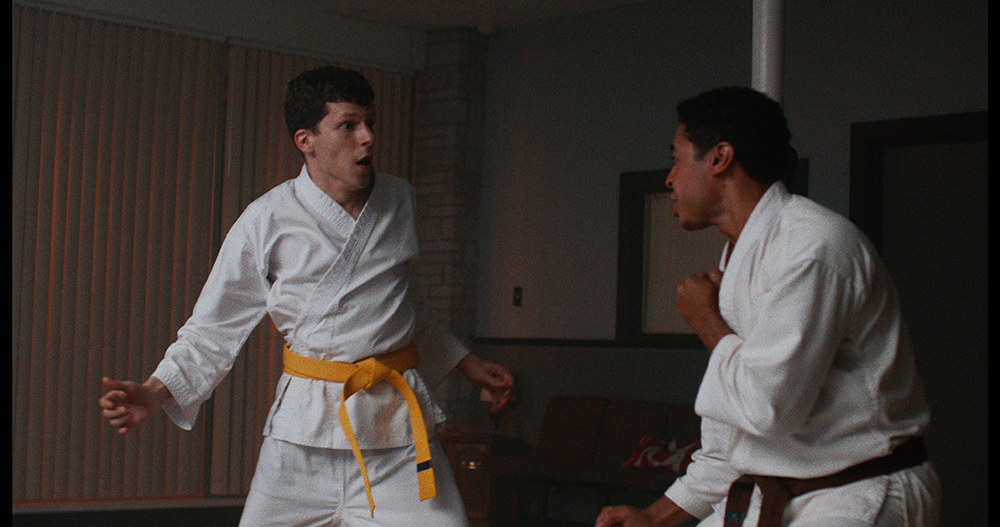
I noticed that. I saw you had a female stunt coordinator, Mindy Kelly, which just adds another layer of irony and absurdity to the whole macho “karate’s only for men” bullshit.
That’s a really good point. And she’s world-class. Like, one of the best in the world. And I’m just remembering: at one point, I look in Sensei’s drawer and find a picture of him and his wife. That’s actually a picture of Mindy and Alessandro. So she’s in the movie in various ways. But you’re right. “Karate’s just for men.” And, of course, this whole thing is designed by women. [Laughs.]
Casey feels like a really intentional subversion of the types of characters you typically play. Was that a big part of the appeal for you in doing this movie?
Yeah, precisely. In fact, when I first read it, after about five pages, I actually put it down. And decided I didn’t want to do it. Five pages is usually a good barometer for what a movie is going to be. But I thought, The dialogue is so funny, let me just keep reading it. I was curious. But I didn’t want to play a role that’s the classic kind of “meek protagonist finds his inner strength,” because I felt like I had done that. So I continued reading, just out of curiosity, and halfway through, I realized this is an entirely different movie than I expected. This subverts the trope of the weak protagonist finding his strength. This is actually a satire on that genre. This is about a guy who finds his strength, and that’s even worse. [Laughs.] That’s even more destructive than his initial weakness. And it’s actually unhealthier for him when my character starts acting out like Sensei tells him to.
Which would probably be around the same time in a boxing movie that the guy is finally finding his strength. It’s actually really horrifying. My character goes around punching people. He becomes a disgusting person. So it’s a real subversion of the genre. Normally, you’d have the montage of the character building himself up with his coach and becoming confident. And in this movie, it’s totally twisted. So the movie’s just this absolutely brilliant satire. If you only watch the first five minutes of it – like I almost did – you’d have the wrong impression.
We’re around the same age. Post-Karate Kid, I feel like these strip mall dojos popped up everywhere in the late ‘80s, early ‘90s. Did you ever take martial arts growing up?
I did. God, it must’ve been 1992 or 1990, I took a few weeks of karate with my older sister. And she was actually pretty good. I was not. I was a really small kid and I hated it. I remember thinking, this was just absurd. Because there’s a kind of seriousness to it, but at the same time, everybody was just taking it because they wanted to learn how to fight. So I had the sense at a young age that, A) I was not going to do a good job [at it] and, B) that there was a kind of silliness to it. This movie, in a way, captures that silliness. Of the sincerity of a strip mall dojo.
But at the same time, because the director, Riley, is actually a jujitsu purple belt, there’s also a love for karate. It’s not like Dodgeball or something, where the sport is always used for laughs. It actually has a love for the sport that it’s using to mock the characters. It’s really talking about the bastardization of the sport by this narcissistic sociopathic Sensei, rather than the sport itself being a joke.
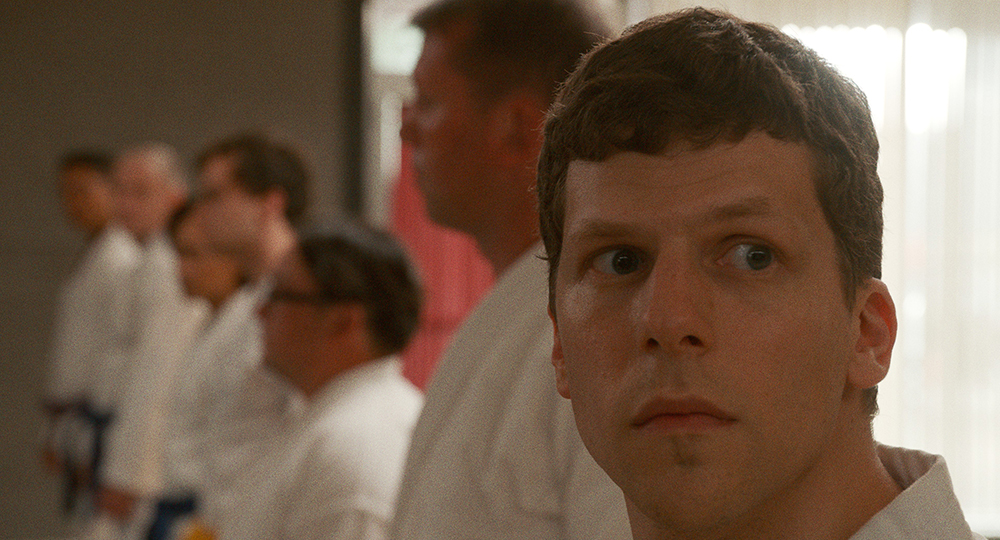
Prepping for this interview, I came across a humor piece that you wrote for The New Yorker, “My NBA Knowledge Comes in Handy.” And I feel like it hits some of the same areas that you’re touching on in this movie. The weird, absurdist concept of “what it means to be a man.” Is that something you were thinking about, even before making this?
Yeah yeah yeah. In fact, it would’ve been like 2011 – I wrote a piece called “A Post Gender Normative Man Tries to Pick Up a Woman at a Bar.” About a guy who is now so progressive that he eschews any kind of male machismo or traditionally male qualities. But in doing so, he’s having an impossible time picking up a woman at a bar. So, yeah, I’ve thought about it a lot. Only because I was the smallest kid in school, and a kid who did musical theatre when everybody else in town played football. So a good coping mechanism for that is to view those boys as ridiculous. Because you’re not going to be able to compete with them on the football field, so the only thing you can do to compete with them is to totally undervalue their importance in society. [Laughs.] And when I read this movie, I just thought it’s such a great dissection of that.
One of the really cool things about the movie is that it takes place in this kind of strange world that looks like the early ‘90s, and it makes me think that the value of men like that is kind of a 25-year-old notion. Thinking about masculinity through the type of music you listen to, and the kind of dog you have, it feels to me like a passé idea of masculinity, and a passé idea of socialization. So I think it’s cool that the movie takes place in this strange-looking past universe, because it falls in line with the idea that the Sensei has of his own [outdated] masculinity.
I feel like a movie like this gives off a real cult vibe, and you’ve also got Zombieland 2 coming up later this year, where people loved the first one so much, they just refused to give up on pushing for a sequel, and now here we are 10 years later. Can you tell when you’re working on a project like this, or like Zombieland, that there’s something about it that could potentially connect with audiences in that way?
I will say you have a sense if something is good and holding together in the way that you were hoping. But no, to see a response to a movie like The Art of Self-Defense has just been shocking. Not because I didn’t think it was great – it was maybe my favorite experience I’ve ever had. But it was just the kind of thing that felt so personal and small to me. It didn’t feel like everybody would appreciate it the way it feels like they are now. So that’s the difference, not that we thought it wasn’t great, but I just thought maybe it was too obscure or strange.
So, no. I was in this movie called The Living Wake, I did it in 2005, and to me, it was so obviously a cult classic kind of movie. I just thought it was great, and it didn’t really catch on. It’s hard to figure out why. Sometimes it’s luck. Zombieland was a surprise too – I thought it was just going to be a genre movie that people saw on opening weekend, and it turned out to be something really special, that people feel is personal to them. So you never know. And you just hope to have one of those every few years. Because it means that you’ll have some kind of sustainable career, because people want to work with people that they’ve seen in cult movies. [Laughs.] That’s the goal.
